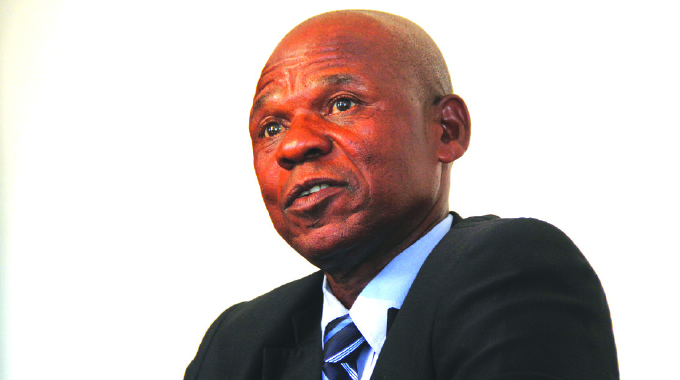Zvamaida Murwira Senior Reporter
LIBERATION war stalwart Colonel (Retired) Kenny Ridzai Mabuya, who died on Tuesday, has been declared a national hero in recognition of his sterling contribution during the liberation struggle that saw Zimbabwe attain its independence in 1980.
Col Mabuya, whose Chimurenga name was Kenny Ridzai, died at West End Hospital in Harare after a short illness.
Last Saturday, Vice President Kembo Mohadi visited him at West Hospital.
Defence Minister, Oppah Muchinguri-Kashiri, who is also Zanu PF Chairman, yesterday visited Tynwald South in Harare, where mourners are gathered and conveyed the message that Col Mabuya had been declared a national hero.
She said President Mnangagwa, together with everyone in the party and Government, were satisfied that Col Mabuya should be declared a national hero owing to his contribution before and after independence.
Burial arrangements will now be agreed on between the Ministry of Home Affairs and Cultural Heritage and the family of Col Mabuya.
“We were assigned by His Excellency, the President on behalf of the party and the Government to convey a message to the Mabuya family that the party has decided to confer a national hero status on our late Colonel Mabuya,” said Minister Muchinguri-Kashiri.
“The party considers a number of attributes before conferring such an honourable status, tracing the history, contribution of an individual not necessarily in the revolution in the sense of the war, but other categories that were added.
“In this particular case, we traced the history of Cde Ridzai, who joined the struggle at a very tender age, when he was in Form 2 when the family had relocated to Zambia.”
He decided at that very early stage to join Zanu that time, approached Zanu PF in Zambia and was received by Cde (Josiah) Tongogara. After three months he was sent to undergo training in Tanzania for two years.”
Minister Muchinguri-Kashiri chronicled the journey travelled by Col Mabuya from the time he joined the liberation struggle until after independence.
“He sacrificed his life to liberate Zimbabwe; we are independent because of that supreme sacrifice. After independence, he decided not to venture into other areas. He had interest in his country, defending the country’s independence, sovereignty and territorial integrity, so he remained in the army.
“He received a number of awards (for his outstanding work). He demonstrated his patriotism, he was a principled person, he persevered, he remained resolute to the values of the struggle (and) we will miss him’
“He was also humble. We will miss him but we are celebrating his legacy and that he will inspire the youths,” said Minister Muchinguri-Kashiri.
A colleague who worked with him in the liberation struggle, Cde Happison Muchechetere said Col Mabuya was a hardworker and disciplined.
“He was on the quiet side. He never had open quarrels with anybody. He would speak softly, even when he is angry you would never know it. We first met in 1974 in Tanzania when it was just after training.
“He was in the security department and I was in the Command and when we came home, he joined the army and I went into journalism, joining the Zimbabwe Broadcasting Corporation. After I left ZBC, we pioneered the War Veterans League together with Cde Mabuya. He was an active member and was Secretary for External Affairs in Mashonaland West province,” said Cde Muchechetere.
His daughter, Sifiso described her father as caring.
“I have lost my father. He was lovely, a true comrade who stood with his children and family. We will miss him.
“We are celebrating his life. He lived as a true father. He never abandoned us. I want to say rest in peace. We are very happy that he was declared a national hero. We want to thank the President for recognising my father’s effort,” she said.
Born on January 12, 1952 in Matabeleland South Province, Filabusi District, Col Mabuya was the second born in a family of five, comprising two boys and three girls.
Sometime in 1954, the family relocated to Zambia where he did his primary and secondary education up to Form 2 at Kamwala in Lusaka.
Col Mabuya and his brother became politically conscious but while the brother joined ZAPU military wing, ZIPRA, he wanted his younger brother to complete school.
Cde Kenny Ridzai decided to join the ZANU military wing as a way of avoiding his brother in ZIPRA since he knew that the brother would send him back to school, before he later joined the liberation struggle whilst in Form 2.
Having been shortlisted at the ZANU offices, the late Col Mabuya left Lusaka for Itumbi Training Camp in Tanzania through Mbeya, together with other recruits.
They commenced training in December 1969, with initial military training coming in January 1970 under the tutorship of Cde Chimedza and some Chinese military instructors.
Cde Kenny Ridzai belonged to that crop of military strategists whose training centred mostly on mass mobilisation tactics, which were critical for the commencement of full throttle guerilla warfare based on the water and fish concept and their training took two years.
In 1972, Cde Ridzai entered Zimbabwe through the Zambezi Valley under the command of Cde Kenneth Gwindingwi and Cde George Rutanhire.
In August 1972, the group registered its first successes in combat when they carried out an ambush in the Chunye area of Mutoko District.
Following the ambush in Mutoko, the group lost contact with each other and Cde Ridzai found himself alone in the area.
He operated as a lone figure along the Nyadire river into Chief Makuni where he was to get refuge in the area, orchestrating mass mobilisation doing it under cover, pretending to be one of the Chief’s sons.
After leaving the Chief’s homestead, the national hero had a memorable ordeal at the hands of Frelimo comrades after they suspected him of being a sellout, but was rescued by one of the visiting commanders who eventually reconnected him with his colleagues.
Cde Ridzai was to later receive further military training in China.
After independence he was attested into the Zimbabwe National Army on May 5 1981.
He rose through the ranks to become Lieutenant Colonel and retired in June 1994 after holding several positions.
Some of the courses he attended include Weapons Course at Zimbabwe School of Infantry, Basic Intelligence Course at Zimbabwe School of Military Intelligence, Officers Foundation Course at Zimbabwe Military Academy.
He was awarded several medals for his continued dedication, selfless and exemplary service to the nation.
The awards include the Liberation Medal for his contribution towards the independence of Zimbabwe, Independence Medal for his contribution towards the Independence of Zimbabwe, and Ten-Year Service Medal.
He is survived by children and grandchildren.
Mourners are gathered at 6924 Davidson Park, Tynwald South, Harare.
SOURCE: HERALD.ZW
newsroom@zimbawamedia.co.uk




